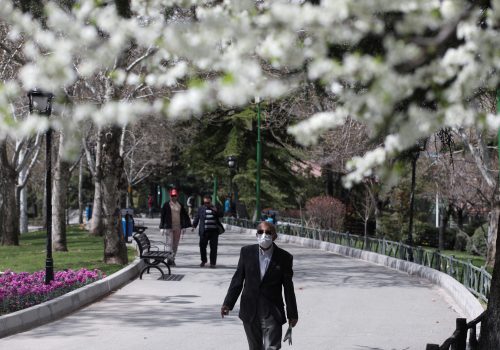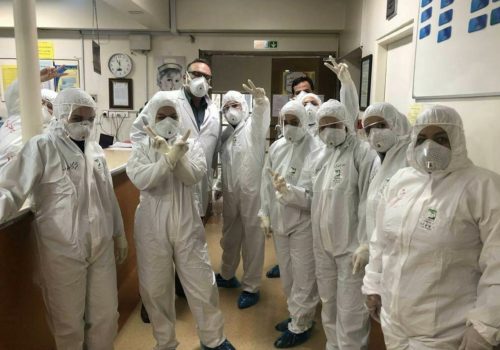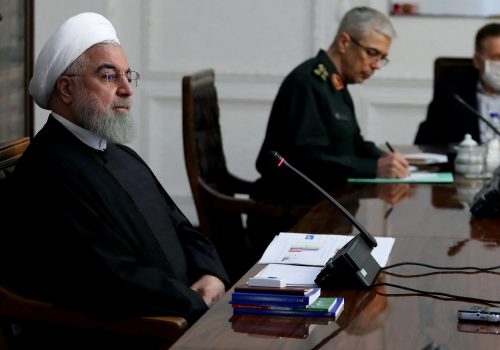Separating fact from fiction and fate: Assessing Iran’s response to COVID-19
A pandemic sweeps away the varnish, a massive crisis that reveals obscured truths about nations and leaders.
In China, the novel coronavirus has shown a ruling regime that is too mendacious and irresponsible to become a global leader. It misinformed the world for weeks about the extent of the original outbreak, costing World Health Organization scientists and other epidemiologists precious time in countering the illness.
In the United States, the pandemic has laid bare the domestic fragility of the world’s leading superpower. Decades of cuts to public infrastructure and national government institutions, as well as a polarized and dysfunctional political leadership and a fragmented governance system, have left it unprepared to grapple with a pandemic its intelligence apparatus has been warning about for years.
The pandemic has also shined a harsh light on the leadership of Iran, one of the nations worst hit by the crisis. The country has one of the best medical and public health infrastructures in the Middle East, exporting its cadre of physicians abroad for decades. But the crisis has revealed a nation where politics and appearances trump public safety.
Iran’s major missteps are devastating and unforgivable. Unlike other countries, including neighboring Turkey, Iran refused to cut off flights to China for weeks into the crisis.
Once it became clear the politically and religiously important city of Qom was the epicenter, it refused to quarantine the holy city. This allowed the seminarians, clerics, and politicians passing through to carry the disease to the capital, where it disproportionately struck the elite, and all thirty-one provinces, where it sprouted fresh outbreaks.
And even after it became evident to the world the coronavirus was spreading in Iran with five official deaths, it insisted on holding February 21 parliamentary elections that, despite record low turnout, drew millions to the polls and likely contributed to the rapid spread of the contagion.
There are other, perhaps lesser failings that are not unique to Iran. Doctors and nurses sound the alarm about a lack of access to protective equipment and medical devices, just as they are in hospitals worldwide grappling with repercussions of a once-in-a-century pandemic that is badly taxing healthcare infrastructures.
As in other Muslim countries, Iran initially bowed to pressure by religious conservatives and dithered on closing shrines and religious sites that drew fundamentalists utterly convinced their faith in God would protect them from coronavirus.
Iran is also strongly suspected of fudging the numbers of cases and deaths to make itself look not as incompetent at handling the pandemic as it is, a pattern seen in other authoritarian states such as Russia and Egypt.
Still, even Iran’s official numbers are dramatic. As of April 1, at least 3,036 had died of COVID-19, including at least 50 Iranian medical personnel, and 47,593 had tested positive, with numbers mounting daily.
“The number there is the number of those we have tested,” admitted Ismael Farzaneh, chief of Ardabil Imam Khomeini Hospital, in a television appearance. “This is a small fraction of the actual number of coronavirus carriers.”
But while Iran’s culpability in perhaps worsening and prolonging the crisis is undoubtable, the country’s rivals—in particular the United States—also play a role in hampering Tehran’s ability to deal with the crisis.
Among the nations hardest hit by coronavirus, only Iran has had to face off against the disease while also being targeted with some of the harshest and wide-ranging sanctions the US has ever imposed on a country, sapping it of the financial wherewithal to address the crisis.
According to numbers gleaned by Bourse & Bazaar, the sanctions enacted by the Trump administration coincide with a decline in imports of medical supplies from the European Union, suggesting that Tehran was either too cash-strapped to import the goods or that companies were reluctant to do business with Iran for fear of provoking the ire of the US. On March 31, Europe announced the first successful transaction with Iran using the INSTEX mechanism to bypass US sanctions and sell an Iranian company medicine. However, the implementation is reportedly unrelated to COVID-19.
Earlier this month, United Nations human rights chief Michele Bachelet urged the US to relax sanctions on Iran and other countries for fear that they contribute to the collapse of medical systems, and contribute to the growth of the pandemic in neighboring Afghanistan, Iraq, and Pakistan.
“Both for global public health reasons, and to support the rights and lives of millions of people in these countries, sectoral sanctions should be eased or suspended,” she said in a statement. “In a context of global pandemic, impeding medical efforts in one country heightens the risk for all of us.”
The European Union, Russia, China, Japan, Uzbekistan, Kuwait, Turkey, and the United Arab Emirates are among the many countries that have already rushed aid to Iran without any conditions.
The US has also supposedly offered aid, which Iran has angrily rejected. Supreme Leader Ayatollah Ali Khamenei claimed that the US could use aid to worsen the illness or spy on the country, which doesn’t sound as ridiculous as it should amid multiple reports that some in the Trump administration view a pandemic killing a person every 10 minutes as the ideal opportunity to take military action against Iran.
Tehran is also fighting COVID-19 while fending off a vicious and likely state-backed propaganda offensive. Well-organized exile operatives spend their days spreading misinformation about the illness, trolling journalists and others struggling to separate facts from fiction.
Across the internet, opposition operatives have forged documents and even faked audio recordings to exaggerate the effects of the pandemic and undermine already shaky public trust in apparent ploys drawn right out of the saboteurs’ manual. Bad information on the internet about coronavirus is already needlessly costing hundreds of lives as Iranians heeded advice in fake articles to drink ethanol in an attempt to ward off coronavirus.
It’s difficult for ordinary people to see a US public servant view a health crisis afflicting ordinary laborers, housewives and nurses in a faraway land as an opportunity to settle decades-old scores, or risk the lives and health of millions of Iranians to realize a long-held fantasy of regime change. But that’s where we are now: both a regime and its opponents perfectly willing to sacrifice innocent lives for political advantage.
Borzou Daragahi is an international correspondent for The Independent. He has covered the Middle East and North Africa since 2002. He is also a Nonresident Fellow with the Atlantic Council’s Middle East Security Initiative. Follow him on Twitter: @borzou.
Image: A couple wear protective face masks, amid fear of coronavirus disease (COVID-19), as they walk at Enghelab square, in Tehran (Reuters)


